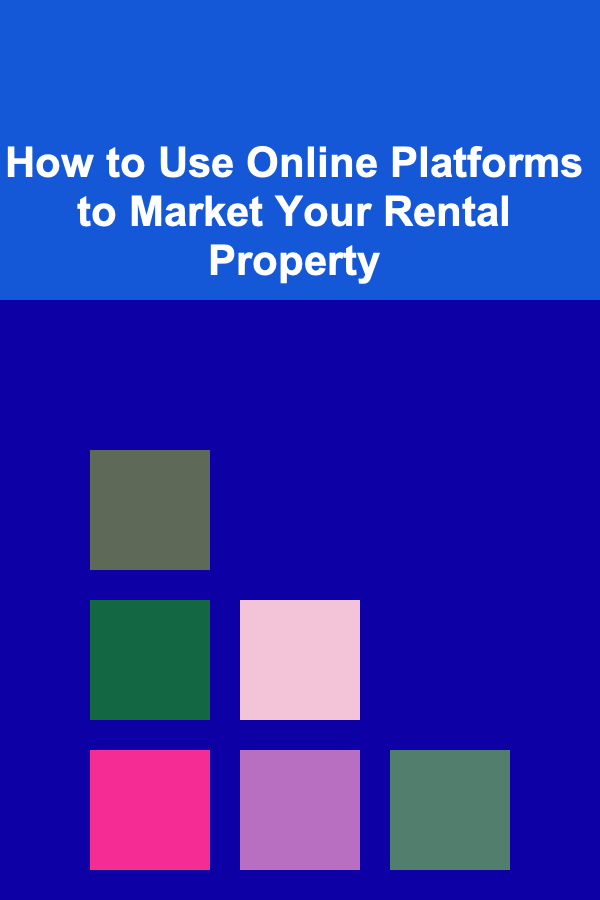
How to Use Online Platforms to Market Your Rental Property
ebook include PDF & Audio bundle (Micro Guide)
$12.99$8.99
Limited Time Offer! Order within the next:

In the digital age, online platforms have become one of the most powerful tools for landlords and property managers to market their rental properties. Whether you're a seasoned property owner or a first-time landlord, understanding how to effectively leverage online platforms can greatly enhance your property's visibility, attract high-quality tenants, and ultimately streamline the leasing process. This guide provides a deep dive into how to use online platforms to market your rental property successfully.
The Power of Online Marketing for Rental Properties
Before diving into the specifics of how to use online platforms to market your rental property, it's important to understand why online marketing is so effective. Traditional marketing methods, such as newspaper ads or flyers, may still have some value, but they no longer hold the same power they once did. The vast majority of potential tenants now begin their rental search online.
According to surveys, over 90% of renters start their search on the internet, with platforms like Zillow, Apartments.com, and social media being among the most popular tools used. In fact, online platforms allow landlords to reach a wider audience, target specific demographics, and receive immediate feedback---all of which are essential to securing a tenant quickly and efficiently.
Online platforms also provide the ability to showcase your property in ways that were not possible with traditional advertising. High-quality photos, virtual tours, and detailed descriptions allow potential tenants to get a comprehensive view of the property, making them more likely to schedule a viewing or submit an application.
Choosing the Right Online Platforms for Your Rental Property
The first step in marketing your rental property online is selecting the right platform or platforms. There are numerous websites and social media tools available, but not all of them will be suitable for every property. The ideal platform for your rental property depends on factors such as the location of the property, the type of property, and your target audience.
1. Listing Websites
Listing websites have become one of the most common ways to market rental properties online. These platforms are dedicated to real estate listings, and they often receive heavy traffic from renters looking for their next home. Below are some of the most popular listing websites to consider.
1.1 Zillow
Zillow is one of the most widely used real estate platforms in the United States. It allows property owners to list their rentals and provides a wealth of tools, including pricing estimates, high-quality images, and virtual tours. Zillow also offers tenant screening services, which can be extremely valuable for landlords looking to filter out unqualified tenants. Listings on Zillow are free for property owners, although premium options are available to increase visibility.
1.2 Apartments.com
Apartments.com is another highly trafficked website that specializes in rental listings. It allows property owners to post listings for apartments, houses, and even vacation rentals. One of the most significant advantages of using Apartments.com is its detailed search features, which allow renters to filter results by location, price, amenities, and more. Apartments.com also offers tools to help landlords market their property, including custom branding and video tours.
1.3 Craigslist
Craigslist is one of the oldest online platforms for rental listings and remains a popular option for landlords. While it lacks some of the bells and whistles of more specialized real estate platforms, Craigslist is easy to use and allows landlords to post rental listings for free. The main downside of Craigslist is that it can sometimes attract spammy or low-quality inquiries, but if used correctly, it can still be a valuable resource for finding tenants.
1.4 Rent.com
Rent.com is another rental listing platform that allows landlords to create detailed listings. It features many of the same tools as Zillow and Apartments.com, including the ability to upload high-quality photos, videos, and floor plans. Rent.com also offers helpful resources, including a moving center, renter's insurance, and information about neighborhood amenities.
2. Social Media Platforms
Social media platforms have become a crucial part of marketing rental properties, especially when trying to reach a younger, tech-savvy audience. By creating social media profiles and using platforms like Facebook, Instagram, and even LinkedIn, landlords can build their brand, interact with potential tenants, and promote their properties.
2.1 Facebook Marketplace
Facebook Marketplace has exploded in popularity as a tool for renting out properties. It allows landlords to post their rental listings for free, and since Facebook has billions of active users, it provides access to a massive audience. In addition to listing properties, Facebook Marketplace allows landlords to interact directly with interested renters through Messenger, making communication fast and seamless.
2.2 Instagram
Instagram is a visually driven platform, which makes it a great choice for showcasing the aesthetic qualities of your rental property. You can post high-quality photos and videos, as well as Instagram Stories, to highlight key features of the property. Instagram also allows for geotagging, which can help attract renters specifically looking in your property's area.
2.3 Twitter
While Twitter is less commonly used for real estate marketing than Facebook or Instagram, it can still be an effective tool for reaching potential tenants. Twitter's fast-paced, real-time nature can help landlords promote new listings and engage with local communities. Using relevant hashtags can also increase the visibility of your posts to a wider audience.
2.4 LinkedIn
LinkedIn may not be the first platform that comes to mind for rental property marketing, but it can still be a useful tool, especially for properties in business districts or areas that attract professionals. Posting about your property on LinkedIn allows you to target professionals who may be relocating for work or looking for a rental near their office.
3. Real Estate Blogs and Forums
Real estate blogs and online forums can be valuable platforms for promoting your rental property. While they may not offer the immediate visibility of major listing sites, they allow for more in-depth engagement with potential tenants.
3.1 BiggerPockets
BiggerPockets is an online community of real estate investors, landlords, and professionals. While the platform is primarily focused on real estate investing, it also features a marketplace where landlords can list their rental properties. Additionally, you can engage with other members, ask for advice, and gain exposure to a specific audience of real estate enthusiasts.
3.2 Local Community Forums
Many cities or neighborhoods have online forums or Facebook groups dedicated to community news, housing, or real estate. Joining these groups and sharing your rental listing can be an effective way to reach local renters who may be interested in your property. Additionally, engaging with community members can help build your reputation as a trustworthy landlord.
How to Create Compelling Listings on Online Platforms
Once you've chosen the right online platforms for your rental property, it's time to create compelling listings. The goal is to attract potential tenants by highlighting your property's best features and presenting it in the most appealing way possible. A well-crafted listing should provide all the essential information while creating a sense of excitement and urgency.
1. Write an Engaging Description
Your property description is one of the most important aspects of your listing. It's where you can provide detailed information about the property and sell its unique features. When writing your description, focus on:
- Highlighting key features: Mention the number of bedrooms, bathrooms, and square footage. Include any special features like a renovated kitchen, new appliances, a backyard, or proximity to public transportation.
- Creating a sense of urgency: If the rental market in your area is competitive, encourage potential tenants to act quickly by mentioning that the property is in high demand or offering limited-time promotions.
- Being clear and concise: Avoid long, rambling descriptions. Keep your listing to the point while still being informative.
2. Use High-Quality Photos and Videos
High-quality photos and videos are essential for attracting potential tenants. In fact, listings with professional photos receive more inquiries than those without. Here are some tips for taking great photos:
- Lighting: Natural light is best, so try to photograph your property during the day when the sun is shining.
- Wide-angle shots: Use wide-angle lenses to make rooms appear larger and more inviting.
- Clean and decluttered spaces: Before photographing, ensure that the space is clean and free of personal items. This will allow tenants to imagine themselves in the space.
In addition to photos, consider adding a virtual tour or video walkthrough. This can give tenants a more immersive view of the property and save them time if they're not local.
3. Set the Right Rent Price
Be sure to include the rent price in your listing, and ensure that it's competitive with other properties in your area. Conduct market research to find out what similar properties are charging and set a price that reflects the value of your property. While it's tempting to set a high rent price to maximize your return, be mindful of overpricing, which can turn potential tenants away.
4. Offer Additional Information
Provide additional information that potential tenants might find helpful, such as:
- Property features: Appliances, parking, pet policy, utilities included, etc.
- Neighborhood amenities: Schools, parks, shopping centers, public transportation, etc.
- Lease terms: Lease length, security deposit, move-in date, etc.
Maximizing Your Marketing Efforts
Once your rental property is listed on various online platforms, the work doesn't stop there. To maximize your efforts and ensure your property stays visible, consider these additional strategies:
1. Use Paid Advertising
Many online platforms offer paid advertising options to boost your listing's visibility. These ads can target specific demographics or geographic areas, ensuring that your property is seen by the right audience. While paid ads come at an additional cost, they can be an effective way to attract more interest, especially in a competitive market.
2. Respond Quickly to Inquiries
In the digital age, tenants expect quick responses. Ensure that you or your property manager responds to inquiries as soon as possible. A delayed response can result in lost opportunities, as tenants are likely to move on to other listings that are more responsive.
3. Use SEO Best Practices
Search engine optimization (SEO) can help increase your property's visibility on search engines like Google. Make sure your listing includes relevant keywords such as the property type, location, and amenities. This can help your property show up in organic search results when potential tenants search for rental properties in your area.
4. Regularly Update Listings
Ensure your listings are up-to-date and reflect any changes to the property or rent. An outdated listing can confuse potential tenants or make them think the property is no longer available. Regularly updating your listing will help keep it fresh and relevant.
Conclusion
Marketing your rental property online is a vital strategy for attracting high-quality tenants and filling vacancies quickly. By leveraging popular online platforms such as Zillow, Craigslist, and social media, you can increase your property's visibility and reach a wider audience. Additionally, by creating compelling listings, using high-quality photos and videos, and offering valuable information, you can create listings that stand out in a crowded market.
Whether you're a seasoned landlord or just getting started, mastering online marketing is an essential step toward building a successful rental property business.
Reading More From Our Other Websites
- [Personal Finance Management 101] How to Make Your Money Work Harder Through Smart Investments
- [Personal Finance Management 101] How to Use Cash Envelopes for Better Spending Control
- [Personal Investment 101] Maximizing Earnings with Deep Learning in the Freelance Market
- [Organization Tip 101] How to Choose Eco-Friendly Products for Your Wellness Area
- [Personal Financial Planning 101] How to Save for a Down Payment on a House Efficiently
- [Home Family Activity 101] How to Explore Nature with Family Hiking Adventures
- [Home Rental Property 101] How to Build Equity with Home Rental Property Investments
- [Home Space Saving 101] How to Use Space-Saving Hacks for Campers
- [Personal Care Tips 101] How to Apply Foundation Without Using a Brush or Sponge
- [Soap Making Tip 101] Milk Magic: Unexpected Benefits of Using Milk in Soap Making

How to Clean Your Dishwasher for Better Performance
Read More
How to Create a Rental Property Lease Agreement That Protects You
Read More
How to Organize Your Music Instruments at Home
Read More
How to Sell Your Rare Collectible Cards on eBay: An Actionable Guide
Read More
How To Interpret Technical Analysis for Crypto Trading
Read More
10 Tips for Stocking a First Aid Kit for Pets
Read MoreOther Products

How to Clean Your Dishwasher for Better Performance
Read More
How to Create a Rental Property Lease Agreement That Protects You
Read More
How to Organize Your Music Instruments at Home
Read More
How to Sell Your Rare Collectible Cards on eBay: An Actionable Guide
Read More
How To Interpret Technical Analysis for Crypto Trading
Read More